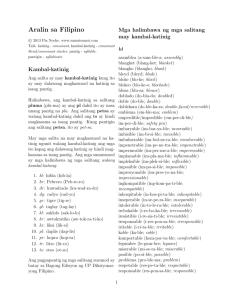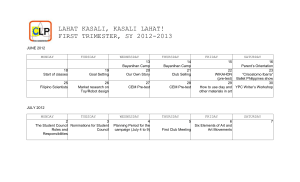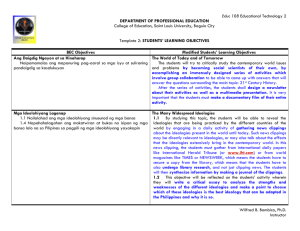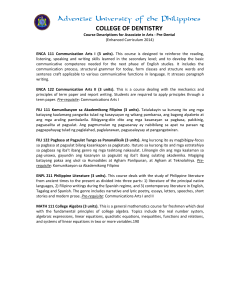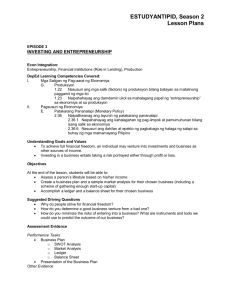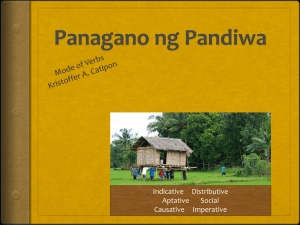The Transformation of Philippine Agriculture
advertisement
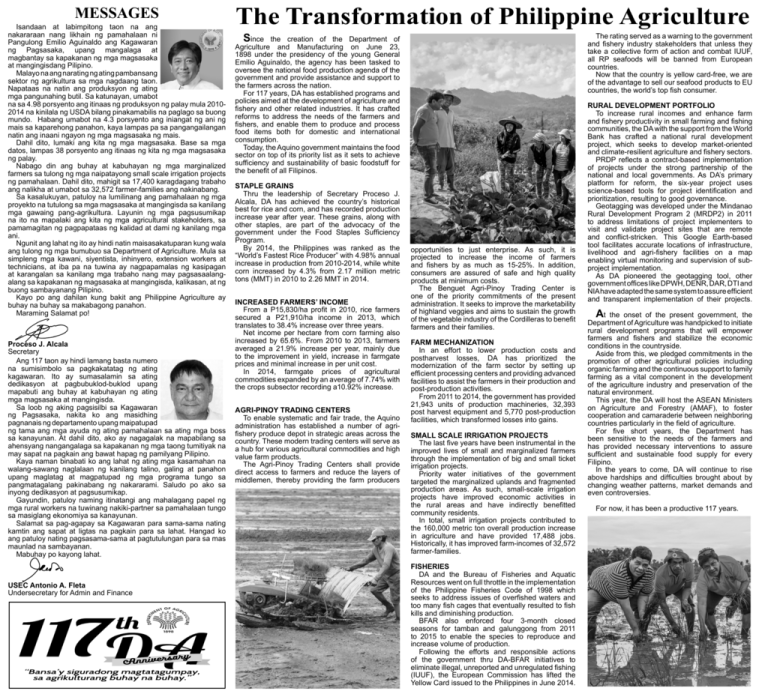
MESSAGES Isandaan at labimpitong taon na ang nakararaan nang likhain ng pamahalaan ni Pangulong Emilio Aguinaldo ang Kagawaran ng Pagsasaka, upang mangalaga at magbantay sa kapakanan ng mga magsasaka at mangingisdang Pilipino. Malayo na ang narating ng ating pambansang sektor ng agrikultura sa mga nagdaang taon. Napataas na natin ang produksyon ng ating mga pangunahing butil. Sa katunayan, umabot na sa 4.98 porsyento ang itinaas ng produksyon ng palay mula 20102014 na kinilala ng USDA bilang pinakamabilis na paglago sa buong mundo. Habang umabot na 4.3 porsyento ang iniangat ng ani ng mais sa kaparehong panahon, kaya lampas pa sa pangangailangan natin ang inaani ngayon ng mga magsasaka ng mais. Dahil dito, lumaki ang kita ng mga magsasaka. Base sa mga datos, lampas 38 porsyento ang itinaas ng kita ng mga magsasaka ng palay. Nabago din ang buhay at kabuhayan ng mga marginalized farmers sa tulong ng mga naipatayong small scale irrigation projects ng pamahalaan. Dahil dito, mahigit sa 17,400 karagdagang trabaho ang nalikha at umabot sa 32,572 farmer-families ang nakinabang. Sa kasalukuyan, patuloy na lumilinang ang pamahalaan ng mga proyekto na tutulong sa mga magsasaka at mangingisda sa kanilang mga gawaing pang-agrikultura. Layunin ng mga pagsusumikap na ito na mapalaki ang kita ng mga agricultural stakeholders, sa pamamagitan ng pagpapataas ng kalidad at dami ng kanilang mga ani. Ngunit ang lahat ng ito ay hindi natin maisasakatuparan kung wala ang tulong ng mga bumubuo sa Department of Agriculture. Mula sa simpleng mga kawani, siyentista, inhinyero, extension workers at technicians, at iba pa na tuwina ay nagpapamalas ng kasipagan at karangalan sa kanilang mga trabaho nang may pagsasaalangalang sa kapakanan ng magsasaka at mangingisda, kalikasan, at ng buong sambayanang Pilipino. Kayo po ang dahilan kung bakit ang Philippine Agriculture ay buhay na buhay sa makabagong panahon. Maraming Salamat po! Proceso J. Alcala Secretary Ang 117 taon ay hindi lamang basta numero na sumisimbolo sa pagkakatatag ng ating kagawaran. Ito ay sumasalamin sa ating dedikasyon at pagbubuklod-buklod upang mapabuti ang buhay at kabuhayan ng ating mga magsasaka at mangingisda. Sa loob ng aking pagsisilbi sa Kagawaran ng Pagsasaka, nakita ko ang masidhing pagnanais ng departamento upang maipatupad ng tama ang mga ayuda ng ating pamahalaan sa ating mga boss sa kanayunan. At dahil dito, ako ay nagagalak na mapabilang sa ahensyang nangangalaga sa kapakanan ng mga taong tumitiyak na may sapat na pagkain ang bawat hapag ng pamilyang Pilipino. Kaya naman binabati ko ang lahat ng ating mga kasamahan na walang-sawang naglalaan ng kanilang talino, galing at panahon upang maglatag at magpatupad ng mga programa tungo sa pangmatagalang pakinabang ng nakararami. Saludo po ako sa inyong dedikasyon at pagsusumikap. Gayundin, patuloy naming itinatangi ang mahalagang papel ng mga rural workers na tuwinang nakiki-partner sa pamahalaan tungo sa masiglang ekonomiya sa kanayunan. Salamat sa pag-agapay sa Kagawaran para sama-sama nating kamtin ang sapat at ligtas na pagkain para sa lahat. Hangad ko ang patuloy nating pagsasama-sama at pagtutulungan para sa mas maunlad na sambayanan. Mabuhay po kayong lahat. USEC Antonio A. Fleta Undersecretary for Admin and Finance The Transformation of Philippine Agriculture Since the creation of the Department of Agriculture and Manufacturing on June 23, 1898 under the presidency of the young General Emilio Aguinaldo, the agency has been tasked to oversee the national food production agenda of the government and provide assistance and support to the farmers across the nation. For 117 years, DA has established programs and policies aimed at the development of agriculture and fishery and other related industries. It has crafted reforms to address the needs of the farmers and fishers, and enable them to produce and process food items both for domestic and international consumption. Today, the Aquino government maintains the food sector on top of its priority list as it sets to achieve sufficiency and sustainability of basic foodstuff for the benefit of all Filipinos. STAPLE GRAINS Thru the leadership of Secretary Proceso J. Alcala, DA has achieved the country’s historical best for rice and corn, and has recorded production increase year after year. These grains, along with other staples, are part of the advocacy of the government under the Food Staples Sufficiency Program. By 2014, the Philippines was ranked as the “World’s Fastest Rice Producer” with 4.98% annual increase in production from 2010-2014, while white corn increased by 4.3% from 2.17 million metric tons (MMT) in 2010 to 2.26 MMT in 2014. INCREASED FARMERS’ INCOME From a P15,830/ha profit in 2010, rice farmers secured a P21,910/ha income in 2013, which translates to 38.4% increase over three years. Net income per hectare from corn farming also increased by 65.6%. From 2010 to 2013, farmers averaged a 21.9% increase per year, mainly due to the improvement in yield, increase in farmgate prices and minimal increase in per unit cost. In 2014, farmgate prices of agricultural commodities expanded by an average of 7.74% with the crops subsector recording a10.92% increase. AGRI-PINOY TRADING CENTERS To enable systematic and fair trade, the Aquino administration has established a number of agrifishery produce depot in strategic areas across the country. These modern trading centers will serve as a hub for various agricultural commodities and high value farm products. The Agri-Pinoy Trading Centers shall provide direct access to farmers and reduce the layers of middlemen, thereby providing the farm producers The rating served as a warning to the government and fishery industry stakeholders that unless they take a collective form of action and combat IUUF, all RP seafoods will be banned from European countries. Now that the country is yellow card-free, we are of the advantage to sell our seafood products to EU countries, the world’s top fish consumer. opportunities to just enterprise. As such, it is projected to increase the income of farmers and fishers by as much as 15-25%. In addition, consumers are assured of safe and high quality products at minimum costs. The Benguet Agri-Pinoy Trading Center is one of the priority commitments of the present administration. It seeks to improve the marketability of highland veggies and aims to sustain the growth of the vegetable industry of the Cordilleras to benefit farmers and their families. FARM MECHANIZATION In an effort to lower production costs and postharvest losses, DA has prioritized the modernization of the farm sector by setting up efficient processing centers and providing advanced facilities to assist the farmers in their production and post-production activities. From 2011 to 2014, the government has provided 21,943 units of production machineries, 32,393 post harvest equipment and 5,770 post-production facilities, which transformed losses into gains. SMALL SCALE IRRIGATION PROJECTS The last five years have been instrumental in the improved lives of small and marginalized farmers through the implementation of big and small ticket irrigation projects. Priority water initiatives of the government targeted the marginalized uplands and fragmented production areas. As such, small-scale irrigation projects have improved economic activities in the rural areas and have indirectly benefitted community residents. In total, small irrigation projects contributed to the 160,000 metric ton overall production increase in agriculture and have provided 17,488 jobs. Historically, it has improved farm-incomes of 32,572 farmer-families. FISHERIES DA and the Bureau of Fisheries and Aquatic Resources went on full throttle in the implementation of the Philippine Fisheries Code of 1998 which seeks to address issues of overfished waters and too many fish cages that eventually resulted to fish kills and diminishing production. BFAR also enforced four 3-month closed seasons for tamban and galunggong from 2011 to 2015 to enable the species to reproduce and increase volume of production. Following the efforts and responsible actions of the government thru DA-BFAR initiatives to eliminate illegal, unreported and unregulated fishing (IUUF), the European Commission has lifted the Yellow Card issued to the Philippines in June 2014. RURAL DEVELOPMENT PORTFOLIO To increase rural incomes and enhance farm and fishery productivity in small farming and fishing communities, the DA with the support from the World Bank has crafted a national rural development project, which seeks to develop market-oriented and climate-resilient agriculture and fishery sectors. PRDP reflects a contract-based implementation of projects under the strong partnership of the national and local governments. As DA’s primary platform for reform, the six-year project uses science-based tools for project identification and prioritization, resulting to good governance. Geotagging was developed under the Mindanao Rural Development Program 2 (MRDP2) in 2011 to address limitations of project implementers to visit and validate project sites that are remote and conflict-stricken. This Google Earth-based tool facilitates accurate locations of infrastructure, livelihood and agri-fishery facilities on a map enabling virtual monitoring and supervision of subproject implementation. As DA pioneered the geotagging tool, other government offices like DPWH, DENR, DAR, DTI and NIA have adapted the same system to assure efficient and transparent implementation of their projects. At the onset of the present government, the Department of Agriculture was handpicked to initiate rural development programs that will empower farmers and fishers and stabilize the economic conditions in the countryside. Aside from this, we pledged commitments in the promotion of other agricultural policies including organic farming and the continuous support to family farming as a vital component in the development of the agriculture industry and preservation of the natural environment. This year, the DA will host the ASEAN Ministers on Agriculture and Forestry (AMAF), to foster cooperation and camaraderie between neighboring countries particularly in the field of agriculture. For five short years, the Department has been sensitive to the needs of the farmers and has provided necessary interventions to assure sufficient and sustainable food supply for every Filipino. In the years to come, DA will continue to rise above hardships and difficulties brought about by changing weather patterns, market demands and even controversies. For now, it has been a productive 117 years.
